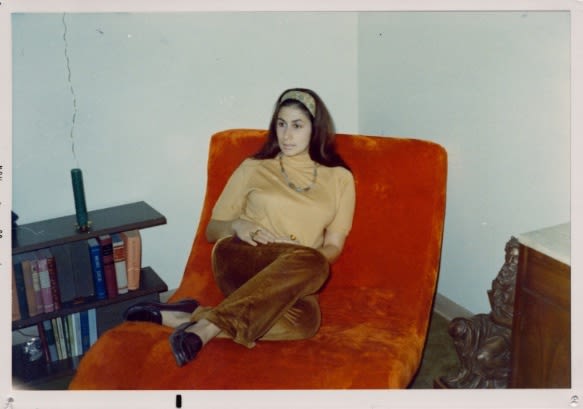A New HBO Doc Chronicles a Pre-Roe Abortion Underground

Judith Arcana, a Portlander featured in HBO's new documentary The Janes
Image: Courtesy HBO
Fifty years ago, Judith Arcana spent the better part of a night in jail. Arcana, then 29, had months earlier given birth to a son, Daniel. As the hours wore on, Arcana’s breasts grew heavy and painful—and so, without a baby to nurse, she leaned over the cell’s dirty sink and used her hands to empty her milk herself.
Arcana had been arrested along with six other young women. All were members of Jane, a clandestine group that carried out an estimated 11,000 abortions in Chicago from 1968 to 1973, when terminating a pregnancy was a crime in nearly every state. Earlier on that day in May 1972, at an apartment on the South Shore that was serving as a makeshift clinic, detectives from the homicide squad had shown up with handcuffs. A grand jury would go on to indict all seven women on charges of felony homicide and conspiracy to commit abortion. Conviction could have meant years in prison. But the women were lucky: the case never went to court, because in January 1973 the Supreme Court ruled on Roe v. Wade, guaranteeing the constitutional right to an abortion. Charges were dropped, and Jane, no longer necessary, dissolved.
Today, of course, the Supreme Court appears on the brink of overturning Roe. If—or, more likely, when—that happens, abortion will become illegal or severely restricted in about half the country. In a bit of timing that borders on cosmically cruel, the leak of Justice Samuel Alito’s draft opinion occurred 50 years to the day after Jane was busted.
Arcana, now 79 and a longtime Portlander—profiled in this magazine in 2018—wasn’t surprised. Back in March, she and I met up at her home, and she brought up the future of Roe. “We all know what the Court is going to do,” she said then. “There’s no mystery here. Those people are obvious. They don’t pretend. Why would anybody assume it might not happen?”
The leak also makes a new documentary about Jane even more urgent. Arriving on HBO on June 8, The Janes is a lively, moving chronicle of the underground service. In vivid interviews, Arcana and other former Janes paint a harrowing portrait of the lengths to which women would go in an attempt to end their pregnancies. Early in the film, an interviewee describes the terror of receiving a mob-organized abortion in a seedy motel room. An ob-gyn recalls how the septic abortion ward at the county hospital was full every day with patients who had attempted to self-induce. From there, the film traces the group from its early days—it began as a referral service that connected pregnant women with physicians willing to perform abortions—to its peak, when members carried out the procedure themselves, up to 100 a week.
When the project picked up steam four years ago, Mississippi had just enacted the restrictive abortion law the Supreme Court now seems poised to uphold. Spearheading the charge? Daniel Arcana, that boy who couldn’t be nursed while his mother was in lockup. Now a film producer, he looped in fellow producer Emma Pildes. (She also happens to be his half-sister: the two share a father, who was married to Arcana and who appears in the documentary as a “Jane husband.”) Pildes approached Tia Lessin, nominated for an Oscar for her 2008 Hurricane Katrina doc Trouble the Water, and the two became codirectors.
“Emma approached me around the time of Brett Kavanaugh’s hearings at the US Senate,” Lessin said recently, speaking from her home in Brooklyn. “The writing was on the wall. It wasn’t just this notion that Roe v. Wade was going to be overturned, but along the way there have been hundreds if not thousands of restrictions [to abortion] that state legislatures have passed. They’ve put up barriers every which way for people to access abortion care.”
Lessin went on: “I think not in our worst nightmares could we imagine that this film would be coming out within weeks of the overturning of Roe. We wished it would be ancient history, that it would just be this cool, weird thing that happened in the past. [But] it’s quite resonant and relevant right now.”
The Janes isn’t the first film about the group—there was a 1995 documentary as well as a fictionalized 2018 film with Arcana as a consulting producer. It’s also part of a current wave of films about abortion. At Sundance this year, The Janes premiered alongside Call Jane, a Hollywood feature starring Elizabeth Banks as a housewife who becomes a Jane, and Happening, an adaptation of Annie Ernaux’s memoir about seeking an illegal abortion in France in 1963.
Rather than drawing parallels between then and now, The Janes wisely keeps its focus on the past. The storytelling is brisk without sacrificing context. We’re reminded, for instance, that this was a time when a woman couldn't get a credit card in her own name and could get birth control only if she was married. Pregnancy was a fireable offense. It was a time of political radicalization, and a number of Janes recount being galvanized by civil rights marches and antiwar protests—and disillusioned by the way they saw men in those movements behaving. “A lot of testosterone and a lot of lecturing,” notes one. Chicagoans, too, had witnessed the police unleashing brutal violence on protesters at the 1968 Democratic National Convention. As Arcana said in her 2018 profile, “That was an atmosphere that in a sense allowed—if not prompted—women of a political turn to understand that the system was never going to be of service. We had to take our lives into our own hands.”
In Jane’s early days, members put up posters on college campuses, ran ads in radical newspapers, and handed out pamphlets at political meetings. “Pregnant? Don’t want to be? Call Jane.” Callers left messages on an answering machine and Janes recorded their details—age, how far along, any known complications—on index cards. In a powerful stretch of the documentary, the women flip through these decades-old cards and read aloud some of the notes: “afraid of pain,” “terrified,” “be cautious father is cop.” Janes counseled women over the phone, detailing the procedure to them and working to soothe nerves. On the day of their appointment, women reported first to one location and were then transported to another for the abortion itself, with drivers taking side streets to deter followers. (It’s a delight of the film to hear these women, now in their late 60s and 70s, relating their experiences as canny 20-somethings flying under the radar of the mob and the police. “That was a case where men’s underestimating women’s abilities worked very well for us,” one says with a wry smile.)
At a time when an illegal abortion could run $500–1,000 (at the high end, that pencils out to more than $7,000 today), the group adopted a pay-what-you-can model. That approach didn’t thrill an abortionist named Mike, who shows up in the documentary as a chortling but compassionate character. And Mike, as it turns out, wasn't actually a doctor; in the film he admits to a background in construction, work he says didn’t pay nearly as well as performing abortions. When that fact leaked, some left the group, but to others it was clear. “If he can do it,” Arcana says in the film, “we can do it.”
Mike trained the Janes who wanted to learn and then departed the group. With the women now wielding the tools—shown and explained in the doc—the service boomed, at its peak providing nearly 100 abortions a week. By this point, it was an open secret: the Janes served too many wives and daughters and mistresses of cops and politicians and judges to believe they were truly escaping notice anymore.
In the end, it was a conservative family member of a patient who ordered the raid in May 1972. The film includes an interview with one of the police officers from that day, and it’s striking to hear him describe how no one from his unit—Irish Catholics all—could have cared less about abortion. But he swings quickly from annoyance at the assignment to confusion at the scene: “The women doing the abortions, that didn’t pop into my head. These are just … ladies.”
When I spoke with Lessin and Pildes recently, I asked if the Supreme Court leak had changed the atmosphere at screenings.
“It’s changed everything,” Pildes said. “It woke a lot more people up.” Two recent screenings in Minneapolis had sold out, with a mood Lessin characterized as “raucous.”
Pildes said the ending of the documentary hits her differently now. In the final moments of the film, we hear the Janes recalling their reactions to the passage of Roe. “It was a hallelujah,” says one. “Truly amazing,” says another. A third: “We were thrilled, and we thought it was over."
“Watching that for the first time after the leak felt devastating in a new way,” Pildes said. “Watching the women talk about the relief they felt when Roe passed, that this was not going to be something that they were responsible for anymore. Some of them were 19! So to sit there and watch them reminisce about that feeling, knowing that it’s about to be overturned—it was a new rage and sadness.”




